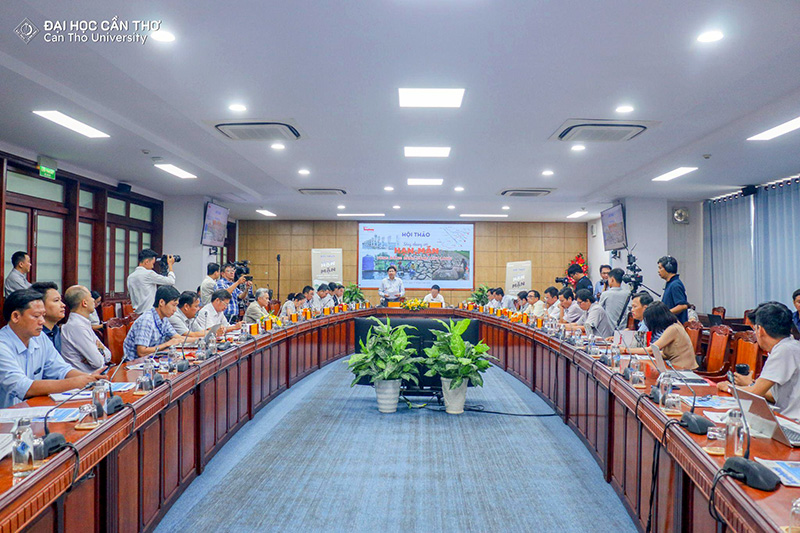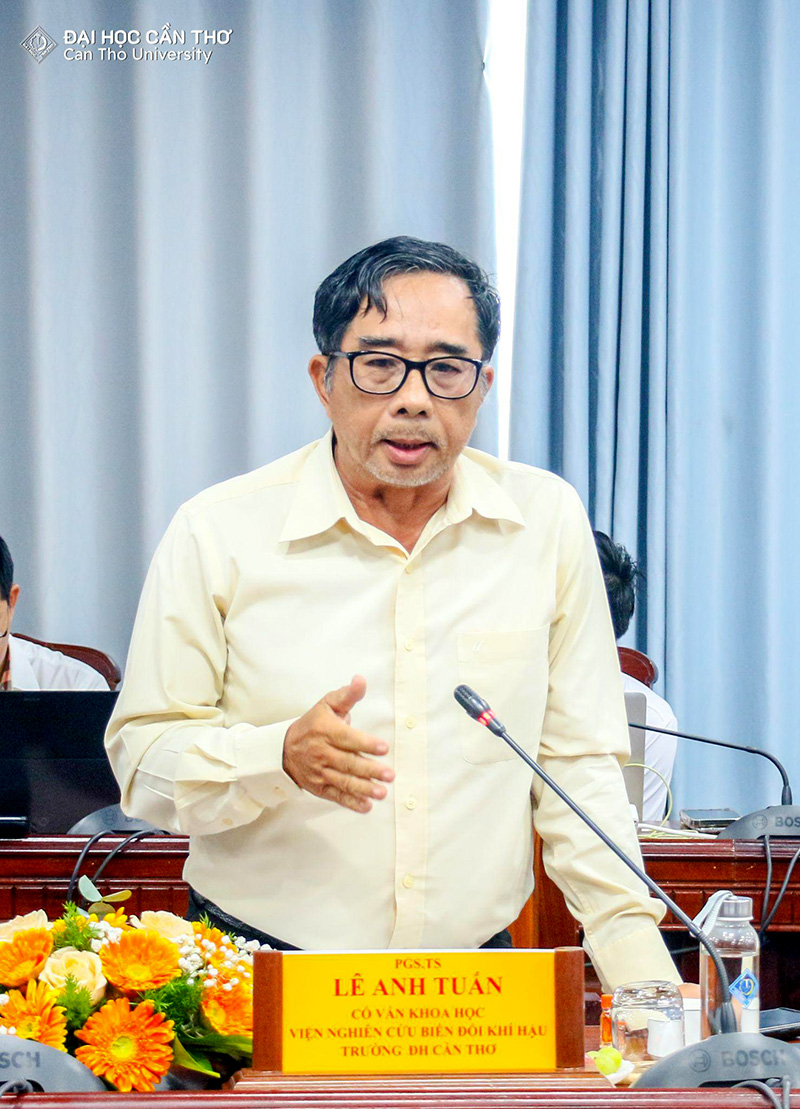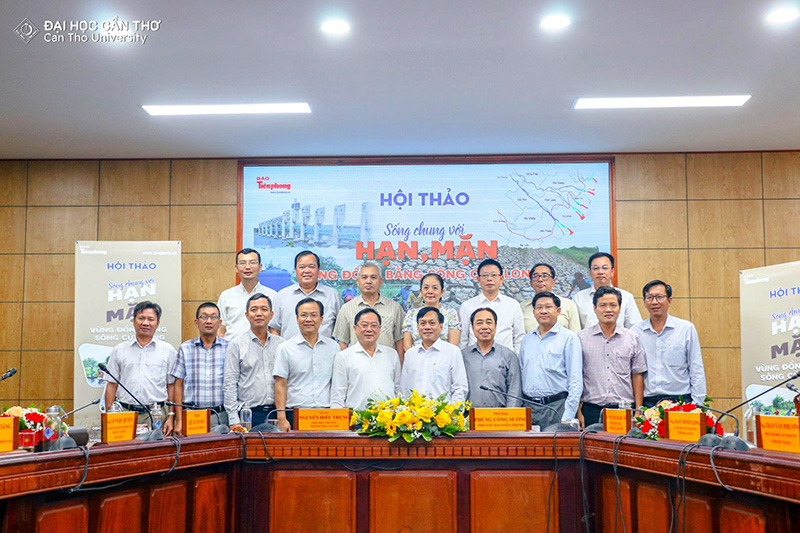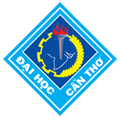On March 27th, 2024, the DRAGON Mekong Institute, Can Tho University (CTU) and Tien Phong Newspaper organized the Symposium on “Living with drought and saltwater intrusion in the Mekong Delta region. The Conference took place at the Rectorate Hall, Administration Building, CTU.
The Conference was attended by representatives of national and local departments and agencies, institutes, universities, and businesses.
 |
|
The Conference took place at the Rectorat Hall, Administration Building, CTU |
Saltwater intrusion in the Mekong Delta region is a serious issue, directly affecting daily life, production, sustainable development of natural resources, and leaving severe consequences for the Mekong Delta region. Besides agriculture, drought and saltwater intrusion can directly affect the fisheries sector and lead to a reduction in biodiversity. This is not only a local issue but affects national food security and the surrounding region. The main cause of saltwater intrusion is climate change, such as prolonged droughts, floods, and sea level rise. In addition, drought and saltwater intrusion also originate from subjective causes caused by humans, such as infrastructure construction, structures that obstruct the natural flow of water, ineffective water management.
 |
|
Assoc. Prof. Dr. Nguyen Hieu Trung, Vice-Rector of CTU, in his opening remarks |
Assoc. Prof. Dr. Nguyen Hieu Trung shared that since the end of 2015, all 13 provinces in the Mekong Delta have been affected by saltwater intrusion, with 11 out of 13 provinces declaring a situation of drought and saltwater intrusion. Although some solutions have been applied to control saltwater intrusion in the region, such as building infrastructures to divert water, store water and prevent saltwater intrusion, besides building coastal dyke systems for all coastal areas in the Mekong Delta, the situation of saltwater intrusion is still ongoing with increasing intensity and complexity. Raising awareness, developing and implementing specific action plans to address issues related to drought and saltwater intrusion, as well as minimizing negative impacts, are urgently needed. In addition to common methods at the regional level, each province in the region needs to implement specific methods suitable to its own conditions. The Conference was expected to achieve valuable scientific and practical solutions for long-term adaptation to drought and saltwater intrusion in production and daily lives of people in the Mekong Delta region.
 |
|
Assoc. Prof. Dr. Nguyen Thi Hong Diep, College of Environment and Natural Resources, CTU, presented the situation of drought and saltwater intrusion in the Mekong Delta region - Adaptation solutions for living with drought and saltwater intrusion |
Proposed by Assoc. Prof. Dr. Nguyen Thi Hong Diep, some solutions to cope with saltwater intrusion include encouraging farmers to collect and store fresh water rainwater effectively and safely; reuse fresh water for livestock and cultivation; transferring technology, focusing on developing and applying new technologies in reality combining with building infrastructures for irrigation systems, coastal dyke systems, river dykes to cope with sea level rise; restructuring livestock and crops to adapt to the real context, planting seasonal crops that can withstand highly saline water; cross-breading salt-alkali-tolerant varieties for higher economic efficiency and loss reduction in production; promoting farmers’ organizations such as cooperatives with specific plan, direction, forecast and addressing common issues in crop and livestock farming.
 |
|
Assoc. Prof. Dr. Le Anh Tuan, the DRAGON Mekong Institute, CTU, evaluated both infrastructure and non-infrastructure solutions to cope with drought and saltwater intrusion. |
Assoc. Prof. Dr. Le Anh Tuan shared that due to the specific characteristics of the soils in the Mekong Delta region, being alluvial and having a poor bearing capacity; it is difficult to build large-scale irrigation constructions. Therefore, experts, investors, and businesses in water resources sector need to find effective solutions for saltwater intrusion prevention. Storing fresh water or dredging land in riverbeds, riverbanks to build dykes to prevent saltwater intrusion for agriculture will cause erosion and subsidence, creating opportunities for seawater to intrude deeper into river mouths thereby severely affecting the area’s soils. It is very difficult to restore soil health and directly impacts the daily lives and livelihood of people in the region.
The participants have discussed to find solutions to cope with drought and saltwater intrusion. They agreed that extreme measures should not be taken to prevent saltwater intrusion, but based on practical requirements and conditions of each place. It is necessary to consider the specific characteristics of each salty, fresh, and brackish area, besides enhance international cooperation, adhere to the mechanisms of the Mekong River Commission and related countries on transboundary water issues to protect national interests. In the future, the Mekong Delta region needs a comprehensive roadmap in many fields and considers drought and saltwater intrusion as cyclical characteristics to develop appropriate plans; strengthen environmental protection, conservation, and development of diverse ecosystems; develop sustainable and effective land and water resource management policies.
 |
|
Group photo |
To address the issues of drought and saltwater intrusion in the Mekong Delta requires the cooperation of relevant authorities and the proactive participation of the people to minimize the negative impacts on life and environment. In the current situation, people in the Mekong Delta region need to have multiple adaptation options to drought and saltwater intrusion, aiming to coastal economic development, food security in the future.
(Website Editorial Board)



 Undergraduate
Undergraduate 